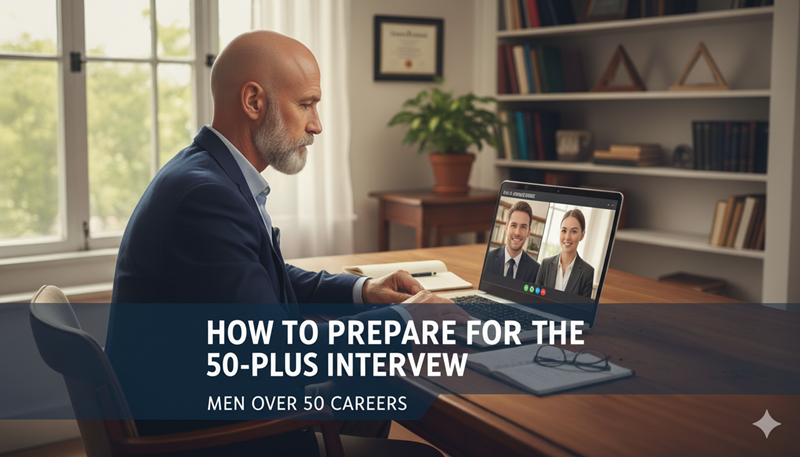The Psychological Barrier for Men Over 50 Re-entering the Workforce
⚙️ Why this matters
🤔 Ever feel like losing your job is losing a part of yourself?
🧩 Loss of Identity
For many men over 50, a job isn’t just a paycheck; it’s routine, status, and purpose. After decades of climbing the corporate ladder or mastering a trade, your role often becomes a key part of who you are.
When that ends, through layoff or early retirement, it can feel existential. Suddenly, the structure, social connections, and sense of achievement tied to work vanish. That loss can trigger feelings of inadequacy and make re-entering the workforce seem daunting.
Losing a work identity isn’t just about the role; it can feel like losing a part of yourself. If left unaddressed, this emotional weight can turn a career transition into a personal crisis.
Recognizing it is the first step. From there, you can begin to redefine your value, rebuild confidence, and explore new directions. 💪
😟 Fear of starting over
- 🤔 Ever felt like starting over means losing everything you’ve built?
- The idea of starting again can feel overwhelming, especially when your identity has been built over decades in one career. For many men over 50, it’s not just a new job — it feels like stepping off a cliff.
- This fear isn’t only about learning new skills or fitting into modern workplaces. It’s the anxiety of the unknown — the “what ifs.”
- 💭 What if I don’t fit in?
- 💭 What if the pay isn’t enough?
- 💭 What if I’m seen as outdated?
- Those thoughts can spiral into paralysis — endless research, constant second-guessing, and no real action. The more you analyze, the harder it becomes to move forward.
- It’s understandable. With responsibilities like mortgages, family costs, and retirement planning, the stakes feel high. But the truth is, this fear is incredibly common — and it’s survivable.
- A helpful tool is “fear-setting” — writing down the worst-case scenarios and how you’d handle them. You’ll often find they’re far less catastrophic than they seem.
- Start small. 💪
- Have an informational chat, take a short course, or apply for a stretch role that excites you. Each step rebuilds momentum and confidence — and reminds you that you’re far from starting over. You’re starting smarter. 🚀
🪞 Imposter Syndrome
- Even after years of success, many experienced professionals still question their worth, thinking their achievements were just luck or good timing. Such self-doubt can make men more modest about their results, leave out key achievements on their résumés, and shy away from claiming leadership roles in interviews.
- This kind of quiet humility can make men downplay their results, leave out measurable outcomes on a résumé, and hold back from owning their leadership stories in interviews. 💪
🧓 Perceived ageism
- 🤔 Ever felt judged by your birth year before you even speak?
- Sensing bias around age can make us pull back, apply for fewer roles, say less in interviews, or even avoid industries that seem “too young.” ⚖️
- Many men over 50 end up self-censoring, downplaying experience, or hiding achievements so they don’t appear “outdated.” The result? Great talent goes unseen.
- The fix isn’t to shrink, it’s to reframe:
- ✅ Present your experience as strategic value (you’ve seen what works and what doesn’t).
- ✅ Refresh how you showcase skills, link them to today’s challenges.
- ✅ Address employer concerns early, showing adaptability and relevant recent work.
- You’re not “too experienced.” You’re ready to contribute at scale. 🚀
🧠 Common emotional patterns and how to reframe them
- Pattern: “I’m too old to learn new skills”
- 💡 Reframe: Decades of experience shorten learning curves; learning is about strategy not age.
- ✅ Action: List three transferable skills from any past role and one concrete example of outcomes produced.
- Pattern: “I’ll appear desperate if I change careers”
- 💡 Reframe: Purpose-driven change reads as strategic reinvention, not desperation.
- ✅ Action: Write a one-sentence career purpose that connects past wins to present goals.
- Pattern: “Employers prefer younger candidates”
- 💡 Reframe: Employers need reliability, judgment, and context that often come with experience.
- ✅ Action: Prepare two short stories (40–60 seconds) showing judgment and mentorship.
🛠️ Practical exercises to rebuild confidence
- Micro-achievement plan
- Day 1: Update one résumé bullet to quantify an achievement.
- Day 2: Reconnect with one former colleague and ask a question about current industry trends.
- Day 3: Learn one feature of LinkedIn and add a professional photo.
- Two-minute legacy script
- Draft a 120–180-word narrative that explains what you do, why you do it, and what you bring now. Read aloud daily for a week.
- Imposter audit
- List three recent wins, three skills used to get those wins, and one way each skill solves a real employer problem.
⚖️ Managing fear and decision fatigue
- 🧭 Limit options to build momentum – Focus on small, testable actions instead of overplanning — each micro-decision moves you forward.
- ⏳ Set a Decision Deadline – Give yourself just one day or one week to take a single, focused step, no more waiting for the “perfect” time. 🚀 Act, then reflect on what you learned and adjust your next move. Progress comes from testing, not endless planning. 🔁
- 🤝 Use Accountability – Schedule a 30-minute weekly check-in with a peer, coach, or supportive community. ⏰Having someone to share progress (and setbacks) with keeps you focused, consistent, and motivated. Momentum grows when you’re not going it alone. 💬
🧍♂️ When to get help
- 🗣️ Coaching for narrative crafting, interview practice, and accountability.
- ❤️ Therapeutic support if worry interferes with daily function.
- 👥 Peer groups for shared experience and role-play practice.
🧩 Closing takeaway
Addressing the psychological barrier is the highest-leverage first step.
Emotional clarity produces better decisions and steadier action than skill-accumulation alone.



